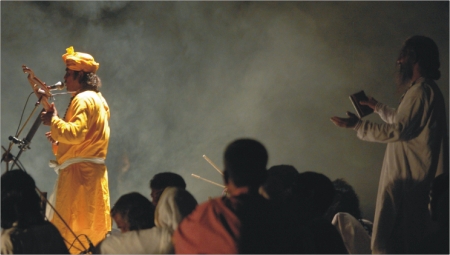 |
|
 |
|
 |
 |
|
 |
|
 |
|
 |
|
 |
|
The folk tradition of Bangladesh is an integral part of our national identity. Ferdousi Rahman discusses the centrality of folk heritage to our existence and describes how the music is woven into the tapestry of everyday rural life.
The voice of the delta
Bangladesh, the riverine delta of the subcontinent, is a new country on the world map. Its culture, however, is a thousand years old. It is known as a land of music. Particularly the folk music of Bangladesh is simple as it is sung by the simple people living in the villages of Bengal. It is easily understood as it is the spontaneous expression of their feelings and emotions. Our folk songs are as rich as they are varied. Bengalis are a proud people possessing a rich cultural tradition evolved through centuries of inter-mingling and admixture of the cultural traits of various races, castes, and tribes, who have lived here since the dawn of civilisation.
Otherwise a poor country, Bangladesh boasts of a rich cultural heritage -- and we are specially rich in folk songs -- but what exactly are folk songs?
"At the back of all literature stretches the unmapped and immeasurable would of oral tradition," says Professor GH Gerould, the famous folklorist of the contemporary world. Before men and women began to write, they made songs and sang them. We have learnt from literary history that all races of man, no matter how primitive, posses a store of compositions which though cannot be called literature, as they have never been written down, nevertheless serves the same purpose as they record action, express feelings and thoughts, and give pleasure in hearing.
From the fact that people without knowing the act of writing composed songs and stories, we may infer that all people since the dawn of intelligence made songs and transmitted them to their children. These compositions which men interred were recorded by memory rather than by pen.
Since the major part of Bangladesh is rural, the people are also rural people, their music is also folk music. Three of the world's largest rivers and their countless tributaries criss-cross the lush green land of Bengal. Here boats are the main means of communication. Where there are boats, there are boatmen too, and these boatmen sing the popular type of folk song called "Bhatiali."
Like any folk song, the composers are after anonymous. These undaunted fearless boatmen while rowing their boats on ocean-like rivers they sing out loud the "Sari" songs which are incomparable.
The other major type of folk song is called "Bhawaiya" or the "cartman's song." These are sung in the northern parts of
Bangladesh like Rangpur, Dinajpur, etc. There, the dusty, rugged, muddy roads take the place of rivers, bullock carts replace boats, and "Bhawaiya" and "Chatke" take the place of Bhatiali. Then we have "Bichhedi" or the song of separation. These songs speak of the sorrows and stresses of separating from ones lover.
Nature plays a great role in our life and in our music. The people living here have constantly to fight against droughts, floods, and other natural calamities. But they are undaunted and sing for rain and cry out to the Almighty Allah when there is a drought.
There are plenty of mystic songs composed by great writers like Hason Raja and Lalon Shah which are very popular throughout the country. We all know that the Bangladeshi people are very religious and have created songs called "Marfati" and "Murshidi."
"Baul" songs are another kind of folk song. Bauls are a sect of singers not belonging to any established religion. Within the entire Bengal there are many types of Bauls -- each adopting a distinct singing style characteristic of the locality. There is also Jari gan, Kobi gan, and Pala gan, which keep the listeners and audience spellbound for nights together in the villages.
Bangladeshi marriages are full of rituals and there are numerous songs composed for each ritual and occasion. These marriage songs are different in district, but some "Biyer gan" have become popular throughout the country.
While talking about the folk songs of Bengal which we are so proud of, the discussion would be incomplete if I did not mention the name of the late legend Abbasuddin Ahmed, who is popularly known as the emperor of folk songs. It was he who collected these folk songs, brought them to Calcutta, convinced HMV, and recorded them about sixty years ago -- and the city people became crazy about them. They become aware of the great treasures of folk song that were scattered in the villages till then.
Abbasuddin did not hesitate to patronise other folk singers like Abdul Alim, Sohrab Hossain, Bekaruddin Ahmed, Kanai Lal Sheel, Nayeb Ali Lepu, Abdul Latif, Osman Khan, Mumtaj Ali Khan and many other singers after he came and settled down in East Pakistan, now our Bangladesh.
We are also proud to have a few singers like Rathindra Nath Roy, Abu Baker Siddique, Mustafazaman Abbasi, Nadia Begum, Neena Hamid, Indromohan Rajbongshi, Sufia Kangalini, Raja Rabbani, Shefali Das, Arati Dhar, Kira Chandra Das, Naggen Rahman, and also a good number of genuine folk singers like Abdur Rahim Bayati.
The question which often comes to my mind is, what are we doing to preserve this rich cultural heritage of ours. There was a time during the 1950s and 1960s when folk music festivals were held every year in Dhaka for several days during the winter season and original and authentic folk songs were presented by the singers who came from different parts of the country.
The festivals were broadcast live from the stage over the radio throughout the night and city-dwellers enjoyed these festivals tremendously. This also gave tremendous impetus to the folksingers who normally performed in the village under the Banyan trees for the local listeners. We haven't had the pleasure of listening to such original singers for the last twenty years.
The composers of folk songs now are being so much influenced by the modern songs and subject matters, that their songs cannot be called folk songs any more. Not only the folk tunes, but the folk wording and subject matter of the folk song is equally important.
Frankly speaking, genuine folk singers are not available any more. Although unfortunate, but it's true that these folk singers have had to give up their singing for dearth of opportunity to continue with their singing. The electronic media seems not so interested in promoting this form of music. Folk songs are presented on television or radio never at any prime times or with proper importance. Our folk instruments like sarinda, khanak, and dhol are becoming obsolete those days and we hardly find any sarinda or khanak player.
I have had the great fortune of going to many parts of the world as member of cultural delegation and in every concert, the type of songs which won people's hearts were folk songs. I have also noticed that there are a lot of similarities in folk songs of most countries. For instance, Tibetan folk songs and the folk songs of Southern China have a great similarity with our Bhawaiya songs. No wonder my father late Abbasuddin Ahmed remarked in his speech in one of the international folk music festivals: "Because all village people are simple, because they think simply, because their songs are simple, because their subject matter is simple, they talk of their simple joys and sorrows, and because people, the tune, the subject matter is simple -- all folk songs of the world are alike."
....................................................
Ferdousi Rahman is an eminent singer.
